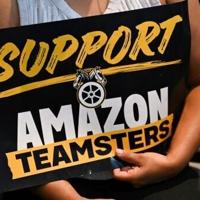The Teamsters, the second largest labor union in the United States, has decided not to endorse either Kamala Harris or Donald Trump for the upcoming November election for the White House.
Could this decision have an impact on the election? And can the support Harris has received from some local branches in key swing states make a difference?
– Who are the Teamsters? –
The International Brotherhood of Teamsters, with a membership of around 1.3 million, was established in 1903. The union has expanded from representing truck drivers to advocating for 10 percent of American union members in various sectors like agriculture, law enforcement, healthcare, and aviation, negotiating and striking when needed.
According to their website, unionized private sector employees earn an average of 38 percent more than non-unionized workers and receive 54 percent more benefits.
– What do they think of the candidates? –
The leadership announced that they will not endorse a candidate due to the lack of majority support among their members for either Democrat Harris or Republican Trump.
The organization’s president, Sean O’Brien, stated that neither candidate has made significant commitments towards supporting labor. However, local branches in swing states like Nevada, Wisconsin, Michigan, and Pennsylvania have rallied behind Harris after the announcement.
– Who have they supported previously? –
The Teamsters have supported every Democratic candidate for the White House since Al Gore in 2000. Before that, they endorsed Republicans Ronald Reagan in 1984 and George H.W. Bush in 1988, then switched to Democrat Bill Clinton in 1992. In 1996, they abstained from endorsing either candidate when Clinton faced Republican Bob Dole.
– What does this mean for Harris and Trump? –
Nelson Lichtenstein, a labor relations expert at the University of California, believes it’s a setback for Harris as Trump could now claim working class support. However, Paul Clark from Pennsylvania State University sees the abstention as disappointing for Harris but not crucial. He explains that national support from unions could be crucial in mobilizing grassroots support, especially in a close election. Additionally, Harris has support from other major unions and local Teamsters branches which could offset this decision.
Clark concludes that in the long run, the endorsement from local unions might have a stronger impact on the election outcome and could potentially push Harris to victory.
elm/ube/st/jgc





